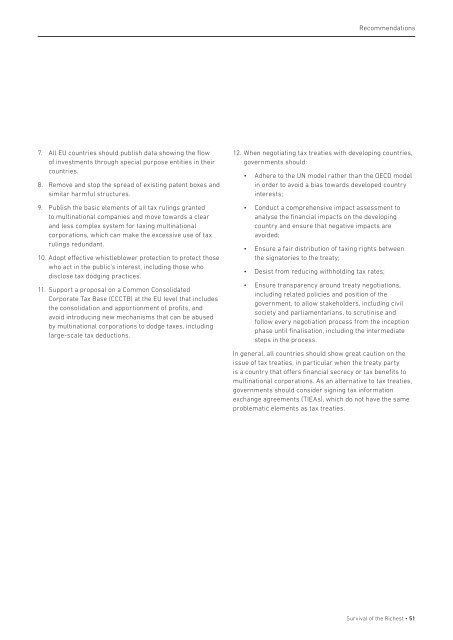Create successful ePaper yourself
Turn your PDF publications into a flip-book with our unique Google optimized e-Paper software.
Recommendations<br />
7. All EU countries should publish data showing <strong>the</strong> flow<br />
<strong>of</strong> investments through special purpose entities in <strong>the</strong>ir<br />
countries.<br />
8. Remove and stop <strong>the</strong> spread <strong>of</strong> existing patent boxes and<br />
similar harmful structures.<br />
9. Publish <strong>the</strong> basic elements <strong>of</strong> all tax rulings granted<br />
to multinational companies and move towards a clear<br />
and less complex system for taxing multinational<br />
corporations, which can make <strong>the</strong> excessive use <strong>of</strong> tax<br />
rulings redundant.<br />
10. Adopt effective whistleblower protection to protect those<br />
who act in <strong>the</strong> public’s interest, including those who<br />
disclose tax dodging practices.<br />
11. Support a proposal on a Common Consolidated<br />
Corporate Tax Base (CCCTB) at <strong>the</strong> EU level that includes<br />
<strong>the</strong> consolidation and apportionment <strong>of</strong> pr<strong>of</strong>its, and<br />
avoid introducing new mechanisms that can be abused<br />
by multinational corporations to dodge taxes, including<br />
large-scale tax deductions.<br />
12. When negotiating tax treaties with developing countries,<br />
governments should:<br />
• Adhere to <strong>the</strong> UN model ra<strong>the</strong>r than <strong>the</strong> OECD model<br />
in order to avoid a bias towards developed country<br />
interests;<br />
• Conduct a comprehensive impact assessment to<br />
analyse <strong>the</strong> financial impacts on <strong>the</strong> developing<br />
country and ensure that negative impacts are<br />
avoided;<br />
• Ensure a fair distribution <strong>of</strong> taxing rights between<br />
<strong>the</strong> signatories to <strong>the</strong> treaty;<br />
• Desist from reducing withholding tax rates;<br />
• Ensure transparency around treaty negotiations,<br />
including related policies and position <strong>of</strong> <strong>the</strong><br />
government, to allow stakeholders, including civil<br />
society and parliamentarians, to scrutinise and<br />
follow every negotiation process from <strong>the</strong> inception<br />
phase until finalisation, including <strong>the</strong> intermediate<br />
steps in <strong>the</strong> process.<br />
In general, all countries should show great caution on <strong>the</strong><br />
issue <strong>of</strong> tax treaties, in particular when <strong>the</strong> treaty party<br />
is a country that <strong>of</strong>fers financial secrecy or tax benefits to<br />
multinational corporations. As an alternative to tax treaties,<br />
governments should consider signing tax information<br />
exchange agreements (TIEAs), which do not have <strong>the</strong> same<br />
problematic elements as tax treaties.<br />
<strong>Survival</strong> <strong>of</strong> <strong>the</strong> <strong>Richest</strong> • 51


